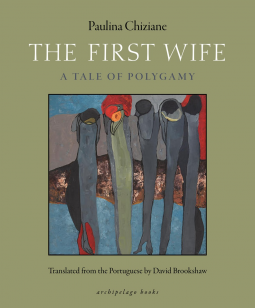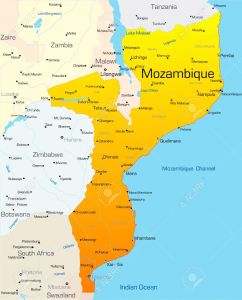
I don’t know much about Mozambique, but a recent fact has really stuck in my mind. Paulina Chiziane (born 1955) is the country’s first published female novelist. I’m going to write that out once more because it needs to be repeated. The first published female novelist in Mozambique is going to be sixty-one this year. I’m no longer amazed at never having a read a book from this country, but I have been reminded of how privileged I am in the wealth of female writers with which I have grown up. I always knew that the only thing stopping me from being an author was lack of inspiration or vocation, not cultural prohibition or educational barriers. As bloggers are covering the Stella and Bailey’s prizes during the spring months, Archipelago’s new translation of Chiziane’s fourth book is a timely reminder of quite how hard publication is for women in other places in the world.

Image from www.123rf.com
The original title of David Bradshaw’s new translation is Niketche: Uma História de Poligamia. It certainly has a different ring to it than the English-language ‘The First Wife’ (which makes me think of the 1996 Diane Keaton film). Instead, the title draws from the gendered tension which explodes about half way through the book, when the group of wives, lead by the narrator, perform a seductive dance for their husband.
“It’s one of our dances, a dance of the Makua,” Mauá explains, “a dance of love that newly-initiated girls do in front of everyone, in order to proclaim: we are women. We are ripened like fruit. We are ready for life!”
Niketche. The dance of the sun and the moon, the dance of the wind and the rain, the dance of creation. A dance that moves and shakes, that heats you up. That makes the body standstill and the soul fly. The girls appear wearing loincloths and beads. They move their body with skill, welcoming the awakening of all springtimes. At the first beat of the drum, each one smiles, celebrating the mystery of life as expressed within the niketche. The old recall the love that has passed, the passion that was lived and lost. Unloved women encounter once again, within the space of the dance, the enchanted prince with whom they gallop away hand in hand on the moon’s back. In the young, the urgency for love is awakened, for the niketche is pure sensuality,the queen of all sensuality. When the dance ends, one can hear the sighs of those who have seen it, as if they were stirring from a pleasant dream.
As the passage above shows, this book is often a celebration of femininity and sexuality. On the other hand, it is also a ‘history of polygamy,’ a relationship pattern which does not traditionally empower women. The blurb of this book suggests a humorous take on relationships and an ironic turn-the-tables story about a group of ‘wives’ who take on their chronically unfaithful ‘husband.’ It does contain this, and his response to the Niketche is as unexpected as it is psychologically astute, but this is only half the story. Firstly, there is a lot of exploration of the female point of view, showing the shame and bitter struggle that undercuts the empowering story of solidarity and success. Secondly, the humour and polygamy only really kicks in about half way through the novel. Until then, it is a portrait of rejection and confusion; a moving, but not a funny take on human relationships.
Despite trying to read widely in translation, it’s rare for me to encounter a book that delivers such a culture shock. Chiziane is not writing for an English audience and I got the impression that her own written and aural tradition, with lists of metaphors and lots of short sentences, was very different from those with which I am familiar. For these reasons, I found this book challenging on a stylistic level, as well as for the determinedly complex take on gender relationships. On reflection though, I think my struggles were in themselves positive because there’s no point in seeking out different literary voices if all you want to hear is the same thing. I highly recommend ‘The First Wife’ to other readers, it will teach you about new world and new ways of writing. It certainly made me more aware of my own privileged position as I embark on the 2016 Bailey’s shortlist and prepare to write my opinions online for all to read. My final views on the book are that I hope more of Chiziane ground-breaking fiction will be available to English language readers soon, and I really hope that my number one fact about Mozambique will soon be superseded by a richer, and more egalitarian, statistic about its publishing scene.
I received my copy of ‘The First Wife’ from the publisher via Netgalley, in exchange for an honest review.



Sounds fascinating Shoshi. Your review has made me wonder about translation in more depth, whether alongside translating words, styles are changed to suit the audiences reading the translations. As you say, this defeats the point of trying to read more widely. I don’t think I’ve read anything from Mozambique – I will explore this country’s literature further 🙂
This is my first Mozambique novel, but I’m certainly keen to look out for other translated fiction from Africa. Right now I feel most of my reading from that continent is heavily slanted to a Western audience (the two Nigerian books I’ve read this year were English language and written by authors who’ve also lived in the UK and/or US)…
This is the second great review I’ve read for this novel so feel something is being strongly suggested to me…
I think those of us who have read it are trying to push it into the limelight. It feels like some countries get pushed off the translated literature lists, so when they appear, you want to publicise the fact to make it clear the enterprise was well worth it!
Pingback: A Mouth Watering Read: ‘Like Water for Chocolate’ by Laura Esquivel (1989) | Shoshi's Book Blog
Pingback: ‘The Accusation: Forbidden Stories From Inside North Korea’ by Bandi | Shoshi's Book Blog
Pingback: ‘Stay with Me’ by Ayọ̀bámi Adébáyọ̀ | Shoshi's Book Blog
Pingback: ‘The Great Ungandan Novel’: ‘Kintu’ by Jennifer Nansubuga Makumbi | Shoshi's Book Blog